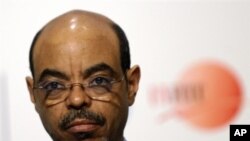Ethiopia's May 23 elections for parliament have produced some interesting match-ups, with several prominent government officials facing stiff competition. One contest pits Prime Minister Meles Zenawi against a former comrade in arms, Aregash Adane.
Aregash Adane seems an unlikely challenger to one of Africa's most respected leaders. Invited for an interview about her bid to unseat the prime minister, she arrives on foot. No aides, no driver, no car.
"I'm only a few kilometers away," she explains, "and I like to walk".
Aregash Adane knows Meles Zenawi well. They are both from Adwa, in the northern Tigray region. The legislative seat they are contesting represents the town. She is three years older than the 54-year-old prime minister, but says they have close family ties.
"Adwa is both his home and my home. His family and my family are very close. They are friends. We are neighbors," she added.
Mr. Meles and Ms. Aregash began their political careers as comrades in a Marxist-Leninist guerrilla group, the Tigrayan People's Liberation Front (TPLF). They fought together to overthrow the murderous Dergue regime led by the Communist dictator Mengistu Haile Mariam. When the Dergue collapsed in 1991, the TPLF seized power.
Mr. Meles became leader of both the TPLF and the new ruling coalition called the Ethiopian People's Revolutionary Democratic Front (EPRDF). Ms. Aregash was the senior female member of the decision-making central committee.
But in 2001, a power struggle split the TPLF. Mr. Meles crushed his opponents. The rival faction, including Aregash Adane, was banished to the political wilderness.
Ms. Aregash says since then, Mr. Meles has followed Leninist principles, establishing himself as the head of a one-party Revolutionary Democratic state.
"It's a dictatorship," she noted. "Revolutionary Democracy is a philosophy of communism or socialism. It was designed by Lenin to create a certain period where they could develop and transit to socialism, so the ideology itself is very dictatorial."
Ms. Aregash says her challenge to the prime minister is not personal, but policy-driven. She argues that after 19 years in power, the EPRDF's promise of democratic socialism has failed to materialize. She calls Revolutionary Democracy an ideology of the past.
"The EPRDF government has failed in the sense that it didn't build or create democratic institutions in the country," she explained. "There is no era of socialism, at least in the immediate future, so the ideology which Meles is still following is, I believe wrong, so I challenge him."
The former guerrilla fighter says voters in Adwa are responding to her message, but she doubts Mr. Meles and the ruling party will give up power through the ballot box. She says Ethiopia's elections are stage-managed affairs designed to produce a desired outcome while giving the impression of multi-party democracy.
"If people voted against EPRDF, they are not ready to accept it, so they have to create an environment where the opposition couldn't get a majority," she said. "The only thing it's trying to do is portray he's creating an environment where the election has been held democratically."
The May 23 election will be the first parliamentary poll since the disputed 2005 vote, which gave the ruling party a solid majority. Allegations of fraud led to violent demonstrations in which nearly 200 protestors were killed. Scores of opposition leaders were tried and sentenced to life in prison for their part in the protests, but later pardoned.
Ethiopia's most recent elections, the 2008 local council polls, also gave the ruling party an overwhelming victory. After most opposition parties boycotted, the EPRDF and its allies won all but three of 3.6 million seats being contested.
Marquee Ethiopia Election Matchup Pits PM vs Former Comrade




